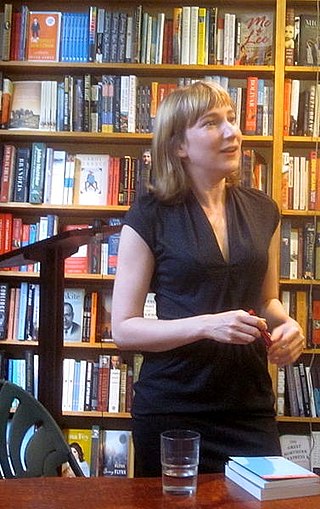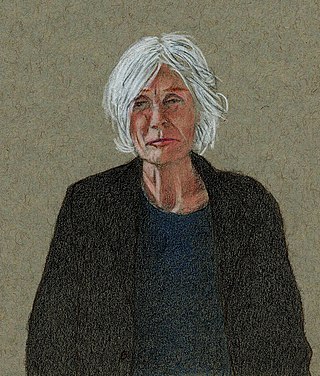Beverley Rosen Simons (born 1938) is a Canadian playwright. Her plays explore artistic form, as well as assumptions of class and gender with a perspicacity ahead of second generation feminism of the 1960s, which influenced her youth.
Beverley Rosen Simons (born 1938) is a Canadian playwright. Her plays explore artistic form, as well as assumptions of class and gender with a perspicacity ahead of second generation feminism of the 1960s, which influenced her youth.
Rosen was born in Flin Flon, Manitoba in 1938, [1] and attended high school in Edmonton, Alberta. She identified as an artist early, and had difficulty deciding whether to study as a pianist or to go into creative writing. With the help of a scholarship to the Banff School of Fine Arts, she decided to pursue writing and eventually enrolled at McGill to study English literature in 1955. At McGill, Rosen became increasingly involved in theatre, helping to found the McGill University Players. After transferring to UBC, she graduated with a BA degree in English and Theatre in 1959.
Rosen's first full-length play, The Elephant and the Jewish Question, was a "well-made" domestic drama staged by the Vancouver Little Theatre for the 1968 Dominion Drama Festival. Subsequently, she avoided the conventions of the "well made" form; her travel and extensive reading about theatre in Japan, Hong Kong, Thailand, and India led her to feel "cramped and dissatisfied…in traditional drama forms of the West" (application to the Canada Council, 1970).
Rosen's second full-length play, Crabdance, was greeted by critics as a brilliant, controversial work. It remains Rosen's best-known play. It has received six professional stagings, dramatizations by CBC Radio and CBC TV (never aired), an ACCESS video of the 1976 Citadel Theatre production, and two editions by in Print publications and Talonbooks.
Rosen's short plays The Crusader and Triangle, Preparing, and Green Lawn Rest Home, reveal a growing frustration with the production restrictions of a realism-oriented Canadian theatre establishment. Presented at a University of British Columbia International Critics' Conference in 1976, these polemical plays are rhythmic, graphic, and allegorical. Preparing "takes a solitary character, Jeannie, on a lifelong journey from adolescent rebellion to dowagerhood." [2] Prologue takes aim at the "ratings-oriented" policies of the CBC, and snipes at audiences who want theatre to be "predictable" or "nice". Instead, her works explore fantasy, brinksmanship, and madness through choral and movement elements that de-stabilize notions of identity, fragment time, and expose power structures within families and communities.
Rosen's most ambitious work, Leela Means to Play (1976), is a sprawling epic that has never been professionally produced despite several workshops. It foregrounds serious Canadian social issues featuring the judiciary, the penal system, Indian Reserves, and psychiatric facilities. The size of the cast, the fluid multi-location setting, and the complex social commentary combined with raw emotional undercurrents of the play might have scared producers seeking Canadian hit shows. A master's thesis suggests that the time for Leela Means to Play will "come around" in a future where civil rights issues of the 1960s and 1970s excite more detailed attention, rather than seeming dated. [3]
Rosen's most recent play, Now You See It (1996), is unproduced and unpublished but received a workshop by Necessary Angel theatre (1996). A description of the script can be found on the Canadian Literary Encyclopedia.

Our Town is a three-act play written by American playwright Thornton Wilder in 1938. Described by Edward Albee as "the greatest American play ever written", it presents the fictional American town of Grover's Corners between 1901 and 1913 through the everyday lives of its citizens.

Tomson Highway is an Indigenous Canadian playwright, novelist, children's author and musician. He is best known for his plays The Rez Sisters and Dry Lips Oughta Move to Kapuskasing, both of which won the Dora Mavor Moore Award for Outstanding New Play and the Floyd S. Chalmers Award.
Sharon Pollock, was a Canadian playwright, actor, and director. She was Artistic Director of Theatre Calgary (1984), Theatre New Brunswick (1988–1990) and Performance Kitchen & The Garry Theatre, the latter which she herself founded in 1992. In 2007, she was made a Fellow of the Royal Society of Canada. Pollock was one of Canada's most notable playwrights, and was a major part of the development of what is known today as Canadian Theatre.
Rick Salutin is a Canadian novelist, playwright, journalist, and critic and has been writing for more than forty years. Until October 1, 2010, he wrote a regular column in The Globe and Mail; on February 11, 2011, he began a weekly column in the Toronto Star.

Beverley Marian McLachlin is a Canadian jurist and author who served as the 17th chief justice of Canada from 2000 to 2017. She is the longest-serving chief justice in Canadian history and the first woman to hold the position.

Wendy Lill is a Canadian playwright, screenwriter and radio dramatist who served as an NDP Member of Parliament from 1997 to 2004. Her stage plays have been performed extensively in theatres across Canada as well as internationally in such countries as Scotland, Denmark and Germany.
Three Tall Women is a two-act play by Edward Albee that premiered at Vienna's English Theatre in 1991. The three unnamed women, one in her 90s, one in her 50s, and one in her 20s, are referred to in the script as A, B, and C. The character of A, the oldest woman, is based in part on Albee's mother. In the first act, B is the caretaker and C is the lawyer for A, while in the second act they become personifications of A from earlier in her life.

Sheila Heti is a Canadian writer.

Martha Kathleen Henry was an American-born Canadian stage, film, and television actress. She was noted for her work at the Stratford Festival in Stratford, Ontario.
Judith Clare Thompson, OC is a Canadian playwright. She has twice been awarded the Governor General's Award for drama, and is the recipient of many other awards including the Order of Canada, the Walter Carsen Performing Arts Award, the Toronto Arts Award, The Epilepsy Ontario Award, The B'nai B'rith Award, the Dora, the Chalmers, the Susan Smith Blackburn Award and the Amnesty International Freedom of Expression Award, both for Palace of the End, which premiered at Canadian Stage, and has been produced all over the world in many languages. She has received honorary doctorates from Thorneloe University and, in November 2016, Queen's University in Kingston, Ontario.

Nandikar is a theatre group in India. The group has its headquarters in Kolkata in the state of West Bengal, but works around the world.

Marianne Letitia Ackerman is a Canadian novelist, playwright, and journalist. Mankind and Other Stories of Women, her fifth work of prose fiction, was published by Guernica Editions in 2016. Her play Triplex Nervosa premiered at Centaur Theatre in April 2015. Triplex Nervosa Trilogy was published by Guernica in 2020.
Erika Ritter is a Canadian playwright, essayist, broadcaster and humorist.
Marie Clements is a Canadian Métis playwright, performer, director, producer and screenwriter. She was the founding artistic director of Urban Ink Productions, and is currently co-artistic director of Red Diva Projects, and director of her new film company Working Pajama Lab Entertainment. Clements lives on Galiano Island, British Columbia. As a writer she has worked in a variety of media including theatre, performance, film, multi-media, radio and television.
Adrienne Kennedy is an American playwright. She is best known for Funnyhouse of a Negro, which premiered in 1964 and won an Obie Award. She won a lifetime Obie as well. In 2018 she was inducted into the Theater Hall of Fame.
Advert|date=July 2019}}

Jordan Tannahill is a Canadian author, playwright, filmmaker, and theatre director.

Caryl Lesley Churchill is a British playwright known for dramatising the abuses of power, for her use of non-naturalistic techniques, and for her exploration of sexual politics and feminist themes. Celebrated for works such as Cloud 9 (1979), Top Girls (1982), Serious Money (1987), Blue Heart (1997), Far Away (2000), and A Number (2002), she has been described as "one of Britain's greatest poets and innovators for the contemporary stage". In a 2011 dramatists' poll by The Village Voice, five out of the 20 polled writers listed Churchill as the greatest living playwright.
Leonard Birman was a Canadian-American actor, who began his career in Montreal. In his 45 years on stage, screen and radio, he portrayed a wide variety of characters, including some choice roles in classical and contemporary theatre.
Karen Fricker is a professor at Brock University and a professional theatre critic, focusing her research in contemporary theatre and globalization, contemporary Québec theatre, popular performances of nation and cultural identities, and Irish theatre. Fricker is the founding editor-in-chief of Irish Theatre Magazine, an online cultural journal that provided coverage of theatre and the performing arts in Ireland. She has also reviewed and broadcast for outlets such as The Guardian, Variety, The New York Times, the BBC, and the CBC. She is currently the theatre critic for the Toronto Star.